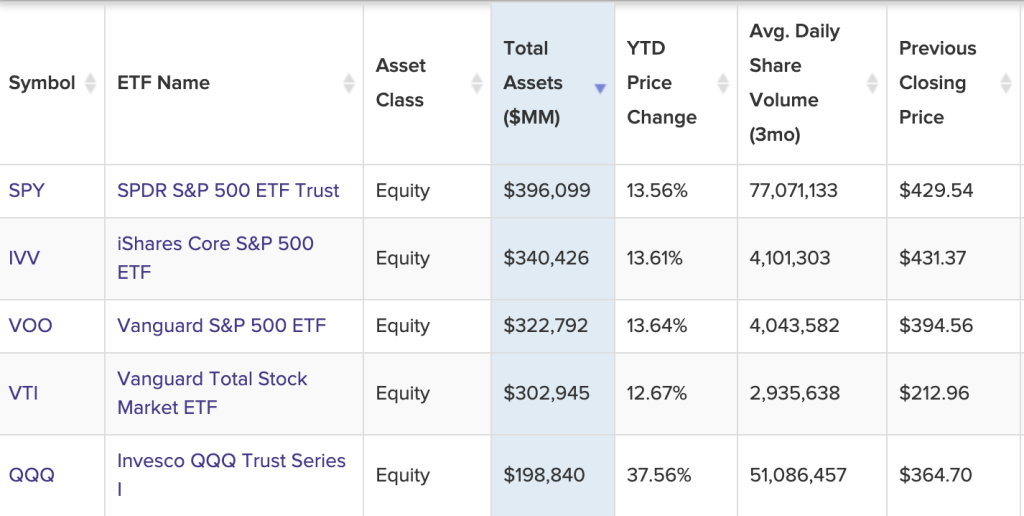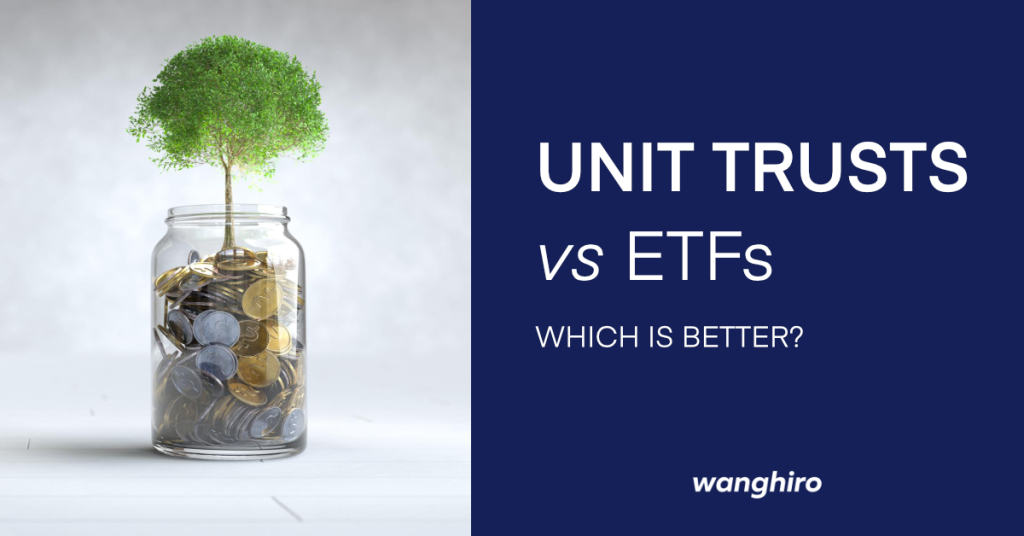Unit trusts are one of the most popular collective investment schemes (CIS) Malaysians invest in. As of December 2022, we have an estimated RM487.94 billion locked up in them.
This isn’t a surprise, given that we have over 60,000 unit trust consultants (UTC) selling them directly to Malaysian investors.
Compared to Unit Trusts, ETFs, on the other hand, are much less popular. While most Malaysians invest in ETFs through robo-advisors, few do directly.
Unlike unit trusts, there are no ETF consultants.
So while you see a lot of Malaysians fill their portfolio to the brim with unit trusts, you’ll find that few do with ETFs.
But are ETFs just as worth investing in as unit trusts?
In this article, we’ll compare unit trusts and ETFs to help you understand how unit trusts and ETFs are similar, and in what ways they differ.
First, let’s begin with a brief understanding of the basics of each one.
What are Unit Trusts? (a 1-min recap)
Unit trusts are funds that are set up for investors who are interested in buying a diverse portfolio of asset classes and don’t want to manage their portfolio themselves.
These funds are set up by fund companies who will appoint a fund manager to help them make sure that investors get the highest return possible. They do this by making investment decisions, monitoring the fund performance and allocating funds into asset classes.
How well a fund performs depends entirely on the decisions made by the fund managers. That is why we call unit trusts ‘actively managed funds’.
One of the most popular companies selling unit trust is Public Mutual – pretty sure most of you have heard of this company before, or even have your money parked inside.
When investors buy unit trusts, they are buying them from the fund companies, not the open market. This means that they can only be sold back to the companies that they were bought from.
What are ETFs? (a 1-min recap)
ETFs share one thing in common with unit trusts in that they were also created for investors who want to put their money in a diverse portfolio but don’t want to actively manage it.
This is why if you look under the hood of ETFs, you’ll find that they also hold a diverse portfolio of asset classes.
But that’s where the similarity ends.
Whereas unit trusts are actively managed funds, ETFs are passively managed. What does this mean?
Instead of having fund managers do all the fund management work, for ETFs, the picking of stocks and portfolio rebalancing is done automatically based on pre-defined algorithms. While there are some actively managed ETFs, they are in the minority.
Take the SPDR S&P 500 ETF for example. This is one of the oldest ETFs in the world and is designed to track the performance of the companies in the S&P 500. No human is involved in picking the stocks – the ETF automatically adds or removes shares of companies based on the S&P 500.
Lastly, unlike unit trusts which have to be bought from the fund companies selling them, ETFs are bought and sold in the stock market like any other stock.
Risks of Buying Unit Trusts vs ETFs
As we’ve seen, both unit trusts and ETFs hold a diverse portfolio. In this way, the risks are similar.
However, due to how they they are structured, there are some additional risks of investing in unit trusts that are not associated with investing in ETFs.
The first thing is company dependence
Unlike ETFs which can be bought and sold in the open market, unit trusts are company dependent products which can only be sold back to the company you bought it from.
Which means: should there come a day when the company folds, you won’t have a cent of your money back.
The next thing is liquidity (or the lack of it)
If you’ve owned unit trusts before, you’ll know that you can’t just walk in and ask for your money back.
The standard procedure is to wait 7 – 10 business days to get your money back in cash after selling your unit trusts.
On the other hand, you can get your money back fairly quickly (1 – 3 days) when you sell your ETFs on the open market.
A longer wait period for liquidation carries some level of risk compared to a short one, depending on your portfolio.
Finally, it’s the lack of transparency
While the holdings inside an ETF can be seen at any time, those inside of a unit trust are not available until a report is out.
So what happens in a unit trust is largely unknown to its investors for long periods of time.
Costs of Buying Unit Trusts vs ETFs
Now that you have a basic idea of how unit trusts and ETFs are structured, now let’s take a look at one of the primary concerns for an investor: cost.
Recall from earlier that unit trusts can only be bought from the companies selling them, while ETFs can be bought in the stock market.
Unit trust fees
When you buy unit trusts from a fund company, you typically pay
- Sales fee – you pay this when you buy unit trusts, usually between 3.0 – 5.5%, and
- Management fee – this is paid to the fund for managing the portfolio, typically between 1.0 – 2.0% per annum
There are other fees as well, but we will consider these as they are the main ones.
So let’s say you put RM10,000 into a fund with a sales fee of 5.5% and a 1.8% management fee, you’ll be charged RM550 upfront, with the RM9,450 balance invested into the fund. Thereonafter, you’ll be charged 1.8% on your capital on a yearly basis.
ETF fees
On the other hand, when you buy ETFs, you typically pay
- Brokerage fee – this is the same brokerage fee you pay when you buy any other stock and the cost depends on the platform you use.
- Expense ratio – an annual fee that ETF providers charge to cover the costs of operating the fund, and covers things like management fees, administrative costs, and other expenses associated with running the ETF. These range between 0.04% – 1.0%.
The SPDR S&P 500 ETF, as we have seen earlier, has an expense ratio of 0.09%.
As you might have noticed, you don’t have to pay a sales fee when you buy ETFs.
Everything considered, fees related to buying an ETF is much lower compared to that for unit trusts.
Minimum Capital of Buying Unit Trusts vs ETFs
The next consideration for an investor is the initial amount you have to put up to invest.
For unit trusts, you usually need an initial capital of RM1,000 to open your fund account.
On the other hand, the cost of ETFs depends on its trading price. Below are the prices of some popular ETF funds at the time of writing (prices are in USD/share):

Since ETFs can be bought on stock platforms, it’s possible to buy fractional shares of them as well. It’s not possible to buy fractional unit trusts, however.
Returns of Unit Trusts vs ETFs
The next thing investors have in mind when considering an investment is the potential returns of the investment.
While the returns of unit trusts vary from one fund to another, StarBiz recently reported an iFast study that found that close to 90% of unit trusts gave lower average returns than the Employer Provident Fund (EPF) over a period of 5 years.
Which means that most didn’t even hit EPF’s 5.6% average.
On the other hand, an ETF like SDPR S&P 500 ETF has returned an average of 10.18% in the last 5 year period.
This is more than double the returns of most unit trusts, meaning that it is very likely for you to find an ETF that can beat the returns of a unit trust than the other way round.
So, Which is the Better Investment? Unit trusts or ETFs?
There’s never a hard and fast answer, but what we can offer as advice is to fully understand what each investment type is about before you invest.
Unit trusts are actively managed and could fit the investor who prefers this investing style. However, the fees are quite high and could erode your capital. On top of that, the returns on most unit trusts are paltry, so if you want to investing in them, taking a good look at their historical performance first might be helpful.
On the other hand, ETFs are cheap to buy and maintain, however, their structure can be tough to understand for a beginner. However, ETF returns have historically been higher than unit trusts and may be worth the initial hassle of understanding them.
New to ETF Investing? Get a Guiding Hand
While there are over 60,000 UTC educating Malaysians about unit trusts, there are limited resources and support when it comes to investing in ETFs.
This can make the process of ETF investing that much more intimidating for the beginner.
If that’s you, we’re happy to let you know that we have created a program for beginners just like you. It’s called ETF Compounders and we’d love to have you join and get support for your investing journey. It’s on waiting list right now, but if you sign up, you’ll be first to be notified.
